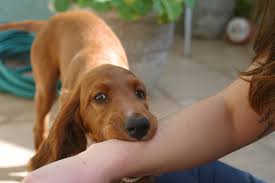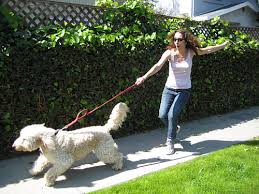You’ve brought your new puppy home and now your hands are full as you attempt to teach your dog right from wrong. During this journey, your first major behavior to tackle is to stop puppy biting. Puppy biting is a normal phase all young dogs go through as they experience their new world. Puppies will mainly bite during playtime or if they’re teething.
Stop Puppy Biting: A Natural Behavior
Biting and rough housing with littermates are where your puppy has picked up this normal behavior. A puppy doesn’t know the power or strength of their bite, so it’s not uncommon for them to bite too hard and cause injury, which is why it’s important for your dog to learn how to control the force of their bite, which is called bite inhibition. A puppy should first learn about bite inhibition when they’re playing with their littermates and their mother. If they bite a littermate too hard, they will note the pain response from the other pup and not use as much force the next time. If the puppy bites the mother, the mother may also bite the puppy back just as sharply, which lets them know immediately that they’ve used too much force. But if a puppy has been taken away from their litter and mother too soon they may not have had the time to properly learn about bite inhibition.

As a pet owner, you can teach your puppy about bite inhibition using a few simple methods, using a mother dog’s training techniques, which your puppy will immediately respond to.
A mother dog may respond to a sharp bite by making a cry of pain and refusing to play with their pup further. As an owner, if you respond to a bite by crying out and stopping playtime immediately, your puppy will understand that they’ve used too much force and may correct this the next time.
Never encourage biting and rough play or shout at your dog if they bite when you’re not in the mood for rough housing. During this time, it’s important to remain consistent in order to avoid confusing your puppy.
Your puppy is testing your limits and waiting for your reaction. They want to know what they can get away with and what behaviors are acceptable. Consistently hiding your hands after a painful bite and firmly saying no will teach your dog that if they can’t play nice they can’t play at all.
How to Keep a Teething Puppy Happy
Puppies also bite people and anything they can get their mouths on when they’re teething. During teething the pup will experience sore, tender and swollen gums, not to mention a lot of tension in the mouth. Buying the right type of chew toys and enough chew toys will give your pup the chewing outlet they need for healthy strong teeth and will also save your personal items from destruction. Choose thick, tough chew toys that are designed to withstand sharp puppy teeth. Pet treats that are also designed to handle a teething pup can give your dog the outlet they need to satisfy their desire to chew.

